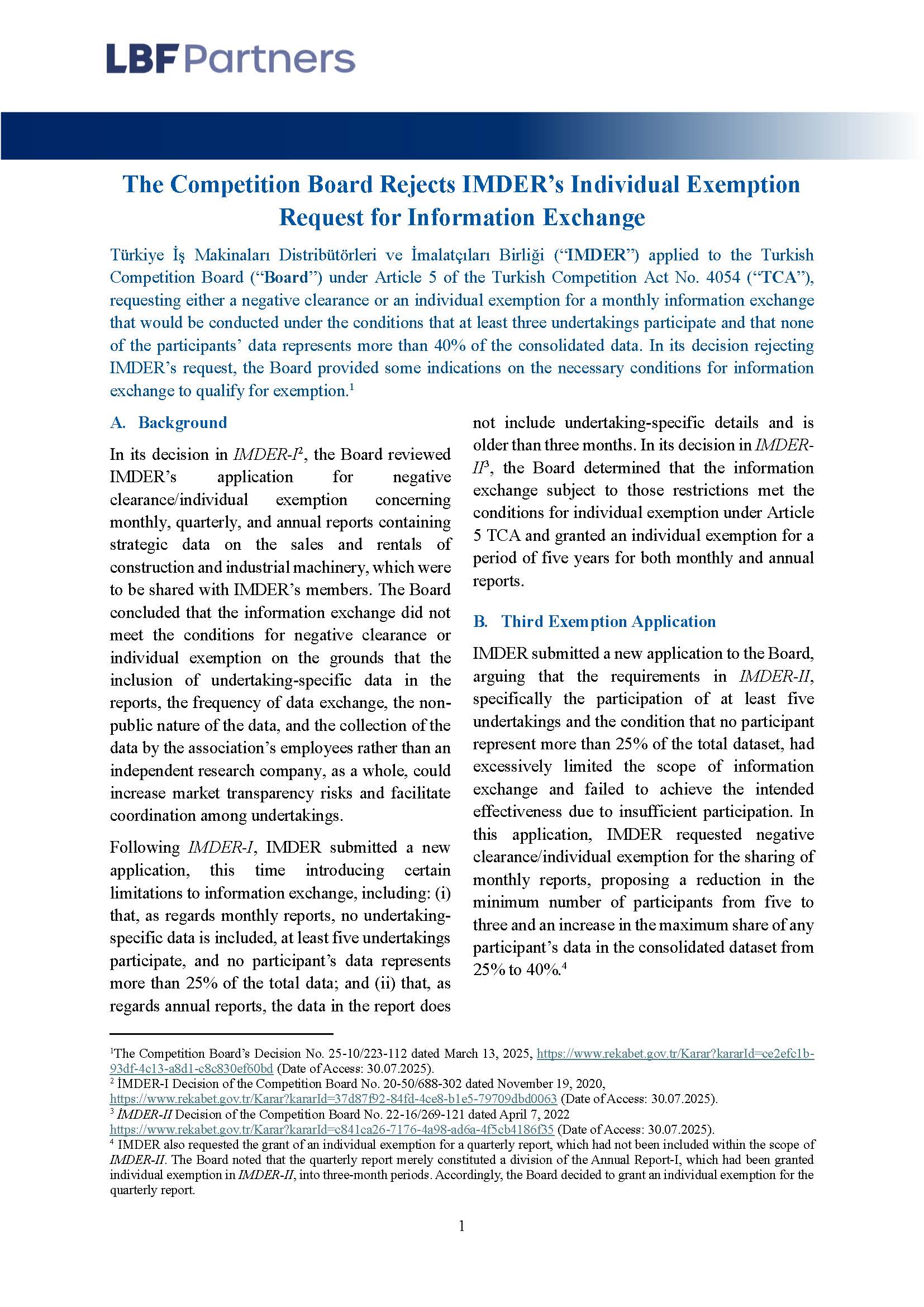The Competition Board Rejects IMDER’s Individual Exemption Request for Information Exchange
Türkiye İş Makinaları Distribütörleri ve İmalatçıları Birliği (“IMDER”) applied to the Turkish Competition Board (“Board”) under Article 5 of the Turkish Competition Act No. 4054 (“TCA”), requesting either a negative clearance or an individual exemption for a monthly information exchange that would be conducted under the conditions that at least three undertakings participate and that none of the participants’ data represents more than 40% of the consolidated data. In its decision rejecting IMDER’s request, the Board provided some indications on the necessary conditions for information exchange to qualify for exemption.(1)
A. Background
In its decision in IMDER-I(2), the Board reviewed IMDER’s application for negative clearance/individual exemption concerning monthly, quarterly, and annual reports containing strategic data on the sales and rentals of construction and industrial machinery, which were to be shared with IMDER’s members. The Board concluded that the information exchange did not meet the conditions for negative clearance or individual exemption on the grounds that the inclusion of undertaking-specific data in the reports, the frequency of data exchange, the non-public nature of the data, and the collection of the data by the association’s employees rather than an independent research company, as a whole, could increase market transparency risks and facilitate coordination among undertakings.
Following IMDER-I, IMDER submitted a new application, this time introducing certain limitations to information exchange, including: (i) that, as regards monthly reports, no undertaking-specific data is included, at least five undertakings participate, and no participant’s data represents more than 25% of the total data; and (ii) that, as regards annual reports, the data in the report does not include undertaking-specific details and is older than three months. In its decision in IMDER-II(3), the Board determined that the information exchange subject to those restrictions met the conditions for individual exemption under Article 5 TCA and granted an individual exemption for a period of five years for both monthly and annual reports.
B. Third Exemption Application
IMDER submitted a new application to the Board, arguing that the requirements in IMDER-II, specifically the participation of at least five undertakings and the condition that no participant represent more than 25% of the total dataset, had excessively limited the scope of information exchange and failed to achieve the intended effectiveness due to insufficient participation. In this application, IMDER requested negative clearance/individual exemption for the sharing of monthly reports, proposing a reduction in the minimum number of participants from five to three and an increase in the maximum share of any participant’s data in the consolidated dataset from 25% to 40%.(4)
C. Board’s Assessment
The Board review the application which proposed lowering the minimum number of participants and increasing the maximum share of each participant’s data by considering recent developments regarding information exchange.
The Board noted that the Statements of Antitrust Enforcement Policy in Health Care, published jointly by the U.S. Federal Trade Commission (FTC) and the Department of Justice (DOJ) in 1996, had established a safe harbor for information exchanges involving data from at least five participants, provided that no single undertaking contributed more than 25% of the total data. However, the Board pointed out that those statements were withdrawn in 2023 on the grounds that they were outdated, failed to reflect market realities, and were overly lenient on information sharing. It gives some hints that even the requirements of at least five undertakings’ participation and a 25% limit for representation in the total data may no longer be deemed sufficient by the Board.
In its decision, the Board also referred to its Guideline on Competition Law Violations in Labor Markets (“Labor Market Guideline”), published on November 21, 2024, which sets out a safe harbor for information exchanges in labor markets. According to these Guidelines, an information exchange is presumed not to have anticompetitive effects if: (i) it is conducted by an independent third party; (ii) the data source or content of individual data cannot be identified; (iii) the exchanged data is at least three months old; (iv) it includes data from at least ten participants; and (v) no single participant’s data represents more than 25% of the total.
Based on those considerations, the Board concluded that reducing the minimum number of participants from five to three and increasing the maximum share of any participant’s data from 25% to 40% would increase the strategic nature of the shared information by lowering the standard for data aggregation. Accordingly, it rejected IMDER’s individual exemption request for monthly reports.
D. Conclusion
The decision in IMDER-III confirms that both the minimum number of participants and the maximum share of each participant’s data in the total dataset are key criteria in assessing individual exemption requests for information exchanges. The reference in the decision to the conditions for safe harbor set out in the Labor Market Guideline indicates that those conditions may also be relevant for information exchanges outside the labor markets. In this respect, we suggest taking into account those conditions when designing information exchange mechanisms in other markets.
For more information and support, please feel free to contact us.
(1)The Competition Board’s Decision No. 25-10/223-112 dated March 13, 2025, https://www.rekabet.gov.tr/Karar?kararId=ce2efc1b-93df-4c13-a8d1-c8c830ef60bd (Date of Access: 30.07.2025).
(2) İMDER-I Decision of the Competition Board No. 20-50/688-302 dated November 19, 2020, https://www.rekabet.gov.tr/Karar?kararId=37d87f92-84fd-4ce8-b1e5-79709dbd0063 (Date of Access: 30.07.2025).
(3) İMDER-II Decision of the Competition Board No. 22-16/269-121 dated April 7, 2022 https://www.rekabet.gov.tr/Karar?kararId=c841ca26-7176-4a98-ad6a-4f5cb4186f35 (Date of Access: 30.07.2025).
(4) IMDER also requested the grant of an individual exemption for a quarterly report, which had not been included within the scope of IMDER-II. The Board noted that the quarterly report merely constituted a division of the Annual Report-I, which had been granted individual exemption in IMDER-II, into three-month periods. Accordingly, the Board decided to grant an individual exemption for the quarterly report.
A. Background
In its decision in IMDER-I(2), the Board reviewed IMDER’s application for negative clearance/individual exemption concerning monthly, quarterly, and annual reports containing strategic data on the sales and rentals of construction and industrial machinery, which were to be shared with IMDER’s members. The Board concluded that the information exchange did not meet the conditions for negative clearance or individual exemption on the grounds that the inclusion of undertaking-specific data in the reports, the frequency of data exchange, the non-public nature of the data, and the collection of the data by the association’s employees rather than an independent research company, as a whole, could increase market transparency risks and facilitate coordination among undertakings.
Following IMDER-I, IMDER submitted a new application, this time introducing certain limitations to information exchange, including: (i) that, as regards monthly reports, no undertaking-specific data is included, at least five undertakings participate, and no participant’s data represents more than 25% of the total data; and (ii) that, as regards annual reports, the data in the report does not include undertaking-specific details and is older than three months. In its decision in IMDER-II(3), the Board determined that the information exchange subject to those restrictions met the conditions for individual exemption under Article 5 TCA and granted an individual exemption for a period of five years for both monthly and annual reports.
B. Third Exemption Application
IMDER submitted a new application to the Board, arguing that the requirements in IMDER-II, specifically the participation of at least five undertakings and the condition that no participant represent more than 25% of the total dataset, had excessively limited the scope of information exchange and failed to achieve the intended effectiveness due to insufficient participation. In this application, IMDER requested negative clearance/individual exemption for the sharing of monthly reports, proposing a reduction in the minimum number of participants from five to three and an increase in the maximum share of any participant’s data in the consolidated dataset from 25% to 40%.(4)
C. Board’s Assessment
The Board review the application which proposed lowering the minimum number of participants and increasing the maximum share of each participant’s data by considering recent developments regarding information exchange.
The Board noted that the Statements of Antitrust Enforcement Policy in Health Care, published jointly by the U.S. Federal Trade Commission (FTC) and the Department of Justice (DOJ) in 1996, had established a safe harbor for information exchanges involving data from at least five participants, provided that no single undertaking contributed more than 25% of the total data. However, the Board pointed out that those statements were withdrawn in 2023 on the grounds that they were outdated, failed to reflect market realities, and were overly lenient on information sharing. It gives some hints that even the requirements of at least five undertakings’ participation and a 25% limit for representation in the total data may no longer be deemed sufficient by the Board.
In its decision, the Board also referred to its Guideline on Competition Law Violations in Labor Markets (“Labor Market Guideline”), published on November 21, 2024, which sets out a safe harbor for information exchanges in labor markets. According to these Guidelines, an information exchange is presumed not to have anticompetitive effects if: (i) it is conducted by an independent third party; (ii) the data source or content of individual data cannot be identified; (iii) the exchanged data is at least three months old; (iv) it includes data from at least ten participants; and (v) no single participant’s data represents more than 25% of the total.
Based on those considerations, the Board concluded that reducing the minimum number of participants from five to three and increasing the maximum share of any participant’s data from 25% to 40% would increase the strategic nature of the shared information by lowering the standard for data aggregation. Accordingly, it rejected IMDER’s individual exemption request for monthly reports.
D. Conclusion
The decision in IMDER-III confirms that both the minimum number of participants and the maximum share of each participant’s data in the total dataset are key criteria in assessing individual exemption requests for information exchanges. The reference in the decision to the conditions for safe harbor set out in the Labor Market Guideline indicates that those conditions may also be relevant for information exchanges outside the labor markets. In this respect, we suggest taking into account those conditions when designing information exchange mechanisms in other markets.
For more information and support, please feel free to contact us.
(1)The Competition Board’s Decision No. 25-10/223-112 dated March 13, 2025, https://www.rekabet.gov.tr/Karar?kararId=ce2efc1b-93df-4c13-a8d1-c8c830ef60bd (Date of Access: 30.07.2025).
(2) İMDER-I Decision of the Competition Board No. 20-50/688-302 dated November 19, 2020, https://www.rekabet.gov.tr/Karar?kararId=37d87f92-84fd-4ce8-b1e5-79709dbd0063 (Date of Access: 30.07.2025).
(3) İMDER-II Decision of the Competition Board No. 22-16/269-121 dated April 7, 2022 https://www.rekabet.gov.tr/Karar?kararId=c841ca26-7176-4a98-ad6a-4f5cb4186f35 (Date of Access: 30.07.2025).
(4) IMDER also requested the grant of an individual exemption for a quarterly report, which had not been included within the scope of IMDER-II. The Board noted that the quarterly report merely constituted a division of the Annual Report-I, which had been granted individual exemption in IMDER-II, into three-month periods. Accordingly, the Board decided to grant an individual exemption for the quarterly report.








 Download PDF
Download PDF

 k.bas@lbfpartners.com
k.bas@lbfpartners.com